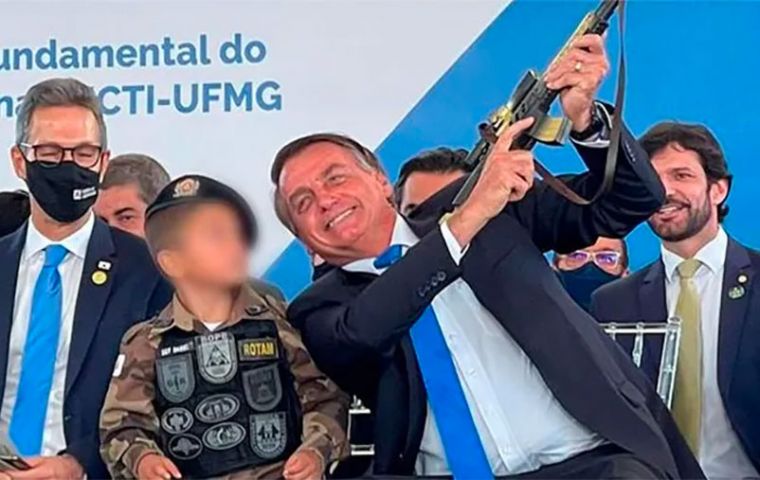MercoPress. South Atlantic News Agency
Bolsonaro fine-tunes terms of Brazil's adherence to ATT
 Any burdensome adjustments will be subject to Congress' approval, Bolsonaro decreed
Any burdensome adjustments will be subject to Congress' approval, Bolsonaro decreed President Jair Bolsonaro has signed a decree extending Congress' role regarding Brazil's adherence to the UN's International Arms Trade Treaty (ATT).
Brazil had pledged to join the arms trade pact in 2013 under then-President Dilma Rousseff, which was ratified in June 2018, during the administration of Michel Temer. With the deposit of the instrument of ratification with the UN in August 2018, the country became a state party to the treaty in November of the same year.
In April 2013, when the UN General Assembly approved the resolution with the text of the treaty, the United Nations Office for Disarmament Affairs (Unoda) guaranteed that the initiative would not interfere in the domestic trade of weapons member states, or in the right to bear them, that it would not prohibit the export of any type of weapon, nor would it infringe the legitimate right of states to regulate the matter at the national level. At the time, then-UN Secretary-General Ban Ki-Moon called the initial adoption of the treaty “a historic diplomatic achievement,” obtained after “many years of effort.”
Signed by President Jair Bolsonaro and Foreign Minister Carlos Alberto França, and published in the Diário Oficial da União (Official Gazette) Tuesday, Decree # 11,173 establishes that any revisions or adjustments that may result in “burdens or burdensome commitments” to the country will be subject to the approval of the National Congress.
The decree also gives publicity to the content of the treaty, which also includes the right of any state to legislate, regulate and control conventional weapons in its territory, but recalls the need for UN member states to prevent and eradicate the illicit trade in conventional weapons.
The “highest international standards” that the treaty sets with the justification of “improving the regulation of the international arms trade” apply to eight types of armaments: small arms and light weapons; combat aircraft; attack helicopters; armored combat vehicles; war tanks; large-caliber artillery systems and warships, as well as missiles and missile launchers.
Each country acceding to the treaty shall establish or maintain a national system of control to regulate the export of ammunition fired, launched or propelled by the aforementioned conventional weapons, and a similar national system to control the export of armaments components. And it will not authorize any transfer of such weapons to third parties if doing so would violate measures imposed by the United Nations Security Council, in particular possible arms embargoes.
Even in situations that do not fall within the list of circumstances in which arms exports are prohibited, each signatory state must assess, “in an objective and non-discriminatory manner,” whether the products could contribute to or undermine peace and security, be used to commit a serious violation of international humanitarian law, human rights, international conventions and protocols relating to terrorism or organized transnational crime.
“Once this assessment has been made and available mitigation measures have been examined, if the exporting state party determines that there is a clear risk of any of the contemplated negative consequences, it shall not authorize the export,” the treaty states, which also establishes that every importing country signatory to the agreement shall provide the appropriate and necessary information for the supplier to assess the circumstances.
This information must include records of export authorizations issued or performed. Signatories to the ATT will also be encouraged to keep records of conventional arms destined for their own territory or in transit.
Each member state will also be required, in accordance with its legislation, to provide the UN secretariat with copies of the control lists, which will be made available to other signatories to the pact. In addition, one year after enacting the treaty, each country must report to the secretariat on the measures it has taken to implement it nationally.
(Source: Agência Brasil)




Top Comments
Disclaimer & comment rules-

Read all commentsI suspect Bolsonaro is getting a lot of money from Taurus and other Brazilian firearms industries.
Aug 18th, 2022 - 01:29 pm 0Commenting for this story is now closed.
If you have a Facebook account, become a fan and comment on our Facebook Page!